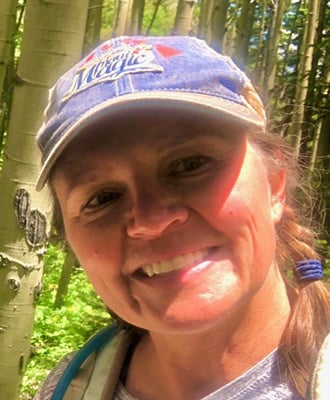A student at the University of Colorado College of Nursing has been awarded a scholarship from the American Psychiatric Nurses Association (APNA) to study and eventually treat an epidemic of mental illness and suicide in Colorado. Julie Bremer was one of 30 student scholars chosen nationwide by APNA. The scholarship will pay for the recipients to attend the APNA annual conference this fall and receive a free membership.
“I was surprised and excited to learn that I was awarded this scholarship. It will help me to connect with other psychiatric nurse practitioner students and providers and I’ll learn about new psychiatric nursing innovations and research,” says Julie Bremer, BSN, RN.
 Julie Bremer, BSN, RN Julie Bremer, BSN, RN |
Get to Know Julie Bremer
Bremer is one semester away from earning a Psychiatric Mental Health Nurse Practitioner (PMHNP) degree from CU this December. She has been a practicing registered nurse at Gunnison Valley Health in Gunnison County since 2005. In a rural hospital with only 24 beds, Bremer gets to care for people in all areas of the hospital including medical/surgical, utilization review, labor and delivery and postpartum. That’s where she found more and more patients struggling with mental illness including perinatal mood and anxiety disorders during pregnancy and the first year after delivery. As many as 1 in 7 moms and 1 in 10 dads experience depression and anxiety during postpartum. Bremer had been one of them.
“I faced postpartum depression with my second daughter. I had little help at the time and didn’t know that postpartum support groups existed. I sought out therapy, which did help, but wish I knew then what I know now about treatment,” says Bremer.
Seeing Postpartum Depression First-Hand Led to PMNP Path
“Perinatal mood and anxiety disorders are one of the most common and least diagnosed complications in obstetrics. Once mothers have babies, they are often left alone to deal with the mental health issues that come with that major change of life. I felt the huge need for mental health care in this area.”
Only years later as a nurse working in Gunnison, did Bremer learn there is an organization called Postpartum Support International (PSI) that offers services and support. She is now a member of PSI and has been volunteering weekly on the peer support helpline for 2.5 years.
Bremer also educates others about suicide prevention through safeTALK because over the last few years, several people she knew took their own lives. Colorado and the intermountain region have the highest suicide rate in the nation. In 2019 alone, 1,287 Coloradans lost their lives. That’s not only higher than any year before, it’s also the highest number of suicides ever recorded in the state, according to the Colorado Health Institute.
Access to Care in Colorado is a Problem, Especially in Rural Communities
Even worse, Colorado has more people suffering with mental illness with less access to care than all but three other states in the nation. More than one in 10 Coloradoans reported they could not get needed treatment for mental health in 2019, according to a Colorado Health Access survey, largely because of cost and lack of insurance. Other times, the care just doesn’t exist. Fifty-five percent of counties in the U.S. do not have a single practicing psychiatrist. In Gunnison County, one of Colorado’s largest counties, there is just one full-time psychiatric provider.
Suicides in her community, the increase in mental illness, and the postpartum experience led Bremer down the path from registered nurse to wanting to study psychiatric mental health and earn a PMPNP degree.
“One full-time psychiatric provider in our county does not provide enough needed mental health care for the community. My long-term goal is to become an integrative psychiatric provider that holistically treats individuals according to their specific needs, whether that includes prescribing medications, using psychotherapy, or offering complementary and alternative choices along with traditional treatments,” says Bremer.
Bremer’s aspirations and scholarship could not be more timely and critical as 1 in 5 adults in the U.S. now experience mental illness, and experts predict the problem will only grow worse.
If you or someone you care about is experiencing a mental health crisis, please call day or night:
- Colorado Crisis Services 844-493-8255
- National Suicide Prevention Hotline 800-273-8255
- Postpartum Support International 800-944-4773



